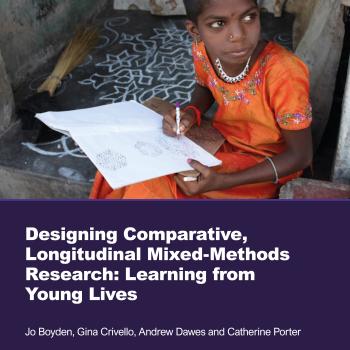
This report is the last in a series reflecting on the Young Lives study and tackles research design, considering the merits, challenges and learning involved in designing comparative, longitudinal cohort research in low- and middle-income countries (LMICs). It reflects on some of the most important decisions involved in shaping the Young Lives research agenda over 20 years of implementation. It forms part of a programme of methodological and operational learning, funded by the Economic and Social Research Council (ESRC), which seeks to strengthen the capacity and effectiveness of longitudinal research in LMICs and contribute to a growing community of practice.
The report completes a set of four papers with the others covering research ethics, research leadership, governance and impact, and data governance and management. Together they aim to inform the work of researchers who are planning or already engaged in longitudinal cohort research in LMICs, and also to explore the opportunities and constraints of comparative, mixed-methods longitudinal work.
The report centres on the more strategic features of research design and opens by briefly outlining the key features of the Young Lives research model. It then explores the principal considerations arising from this model, focusing on three key design features: longitudinal design, the the multi-disciplinary, mixed methods research framework and cross-national comparisons. The conclusion summarises key learning points from Young Lives experience, reflecting on the opportunities and challenges of longitudinal cohort research in LMICs.
Read more on Young Lives methodological lessons and learning on our webpage here

This report is the last in a series reflecting on the Young Lives study and tackles research design, considering the merits, challenges and learning involved in designing comparative, longitudinal cohort research in low- and middle-income countries (LMICs). It reflects on some of the most important decisions involved in shaping the Young Lives research agenda over 20 years of implementation. It forms part of a programme of methodological and operational learning, funded by the Economic and Social Research Council (ESRC), which seeks to strengthen the capacity and effectiveness of longitudinal research in LMICs and contribute to a growing community of practice.
The report completes a set of four papers with the others covering research ethics, research leadership, governance and impact, and data governance and management. Together they aim to inform the work of researchers who are planning or already engaged in longitudinal cohort research in LMICs, and also to explore the opportunities and constraints of comparative, mixed-methods longitudinal work.
The report centres on the more strategic features of research design and opens by briefly outlining the key features of the Young Lives research model. It then explores the principal considerations arising from this model, focusing on three key design features: longitudinal design, the the multi-disciplinary, mixed methods research framework and cross-national comparisons. The conclusion summarises key learning points from Young Lives experience, reflecting on the opportunities and challenges of longitudinal cohort research in LMICs.
Read more on Young Lives methodological lessons and learning on our webpage here

